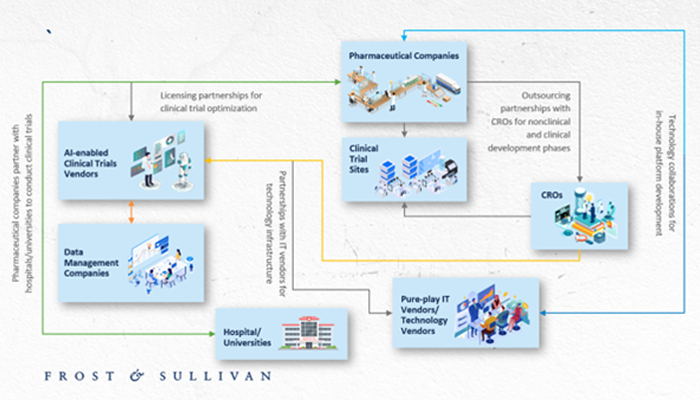As clinical trials become more complex with new therapies, technology is playing a crucial role in enhancing trial designs and modalities. Artificial intelligence (AI) is emerging as a game-changer in decentralized and patient-centric trials. AI has the potential to revolutionize clinical trial design, recruitment, management, and execution, making them faster and more efficient.
AI is not just about improving efficiency; it’s about driving groundbreaking innovation. It is enhancing how we collect and analyze real-world data and developing patient-focused endpoints. By standardizing data from various sources, AI streamlines trial processes, reduces patient burden, and increases the likelihood of success.
Modernizing Clinical Trials with AI
The increasing volume of data from publicly available data sources, electronic medical records (EMRs) and many more, is accelerating AI adoption in clinical trials. Although robust patient databases exist, they often lack clarity and structure, making them difficult to use effectively. AI and machine learning (ML) are turning this unstructured data into valuable insights, helping companies leverage these existing data sources more efficiently, thereby improving trial outcomes.
Growth Drivers in Clinical Trials with AI
- Rising Focus on Precision Health: AI platforms are precisely identifying the ideal patient cohorts, making outreach effortless and significantly boosting success rates.
- Harnessing Economies of Scale with Process Automation: AI tools are automating the entire clinical trial process, from design to recruitment to site selection to execution. These tools enhance efficiency and patient confidence with intuitive mobile interfaces.
Addressing Industry Challenges with AI
The clinical trial industry faces several challenges, including rising competition, global disruptions, and rapid technological changes. AI is addressing these issues by enhancing efficiency, reducing costs, and streamlining operations. It also facilitates collaboration between traditionally separate industries, creating new opportunities for growth and innovation.
Growth Restraints in AI-Enabled Trials
- Challenges with Historical Data: Many AI platforms rely heavily on outdated databases, which can undermine trial outcomes. The push for real-time data collection from wearable devices is essential.
- Mismatch in Clinical Applicability: While AI and ML algorithms enhance trial designs, they may not align perfectly with individual patient care workflows, potentially leading to trial failures despite promising simulations.
The AI Vendor Ecosystem in Clinical Trials
AI-driven solutions are becoming essential in clinical trial design, site selection, and patient identification. Contract research organizations (CROs) and pharmaceutical companies are using AI to refine their go-to-market strategies, improve patient recruitment, and enhance retention for decentralized trials. Interactive tools like voice recognition systems and chatbots are increasing patient adherence, aiding in investigator selection, and optimizing trial site choices.

Graphical Representation: Flowchart of Partnerships Between Pharmaceutical Companies, CROs, AI Vendors, and Tech Providers in Clinical Trials
Leading Companies Using AI
Leading CROs and pharmaceutical giants are at the forefront of integrating AI into clinical trials. Icon plc, Novotech, Syneos Health, and IQVIA, some of the leading CROs are pioneering AI solutions for site selection and patient recruitment. Pharma industry leaders like BMS, Amgen, AstraZeneca, and Novartis are leveraging AI to streamline trial stages and achieve impressive outcomes.
Our Perspective on AI’s Impact on Clinical Trials
As AI continues to shape the future of clinical trials, the focus is shifting towards precision medicine and patient-centric approaches. AI tools are improving patient identification through digital biomarkers, managing trial operations more effectively, and enhancing drug development by organizing data from EMRs and real-world evidence (RWE). Collaboration between technology providers and pharmaceutical startups is paving the way for more effective, efficient, and patient-friendly clinical trials.
In conclusion, AI is not just a future tool; it’s already transforming clinical trials today. Companies adopting AI-driven solutions will lead the evolving clinical research landscape, staying competitive while delivering innovative healthcare solutions.
Explore how AI is transforming clinical trials with our latest analysis, ‘Innovative AI-Enabled Clinical Trial Companies: Strategic Profiling and Growth Opportunities.’ Discover essential growth strategies and best practices by clicking here.
Unlock growth opportunities tailored to your company’s needs with a personalized Growth Dialog with our expert team. Click here to begin your industry transformation journey.



